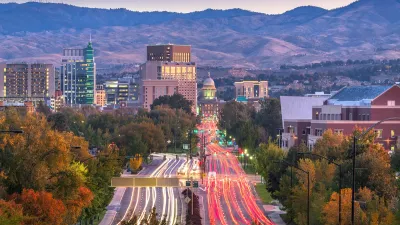A study of residents in Beijing, China who became car owners indicates that they used alternative transportation modes less after buying cars.

A study published in the journal The BMJ tracked a group of adults in Beijing, China after they won a randomized lottery allowing them to purchase vehicle permits. "The study found that getting a car had a significant impact on people’s physical activity. They walked less. They cycled less. They used less public transit," reports Susan Perry.
Ninety-one percent of the 180 people in the survey sample who won permits ended up getting cars. This allowed researchers to compare their activity levels and travel behavior to individuals who did not own cars. In addition to fewer transit rides and less cycling, individuals over the age of 50 gained an average of 23 pounds.
"These results offer a message for all us. They suggest that the ways we — as individuals and as a society — choose to transport ourselves, particularly in our cities, can have a direct impact on our health," adds Perry.
FULL STORY: Owning a car is linked to less physical activity and weight gain

Study: Maui’s Plan to Convert Vacation Rentals to Long-Term Housing Could Cause Nearly $1 Billion Economic Loss
The plan would reduce visitor accommodation by 25,% resulting in 1,900 jobs lost.

North Texas Transit Leaders Tout Benefits of TOD for Growing Region
At a summit focused on transit-oriented development, policymakers discussed how North Texas’ expanded light rail system can serve as a tool for economic growth.

Using Old Oil and Gas Wells for Green Energy Storage
Penn State researchers have found that repurposing abandoned oil and gas wells for geothermal-assisted compressed-air energy storage can boost efficiency, reduce environmental risks, and support clean energy and job transitions.

Private Donations Propel Early Restoration of Palisades Playground
Los Angeles has secured over $1.3 million in private funding to restore the Pacific Palisades playground months ahead of schedule, creating a modern, accessible space that supports community healing after recent wildfires.

From Blight to Benefit: Early Results From California’s Equitable Cleanup Program
The Equitable Community Revitalization Grant (ECRG) program is reshaping brownfield redevelopment by prioritizing projects in low-income and environmental justice communities, emphasizing equity, transparency, and community benefits.

Planting Relief: Tackling Las Vegas Heat One Tree at a Time
Nevada Plants, a Las Vegas-based nonprofit, is combating the city’s extreme urban heat by giving away trees to residents in underserved neighborhoods, promoting shade, sustainability, and community health.
Urban Design for Planners 1: Software Tools
This six-course series explores essential urban design concepts using open source software and equips planners with the tools they need to participate fully in the urban design process.
Planning for Universal Design
Learn the tools for implementing Universal Design in planning regulations.
Ascent Environmental
Borough of Carlisle
Institute for Housing and Urban Development Studies (IHS)
City of Grandview
Harvard GSD Executive Education
Toledo-Lucas County Plan Commissions
Salt Lake City
NYU Wagner Graduate School of Public Service




























